The week ahead in Parliament
- Published
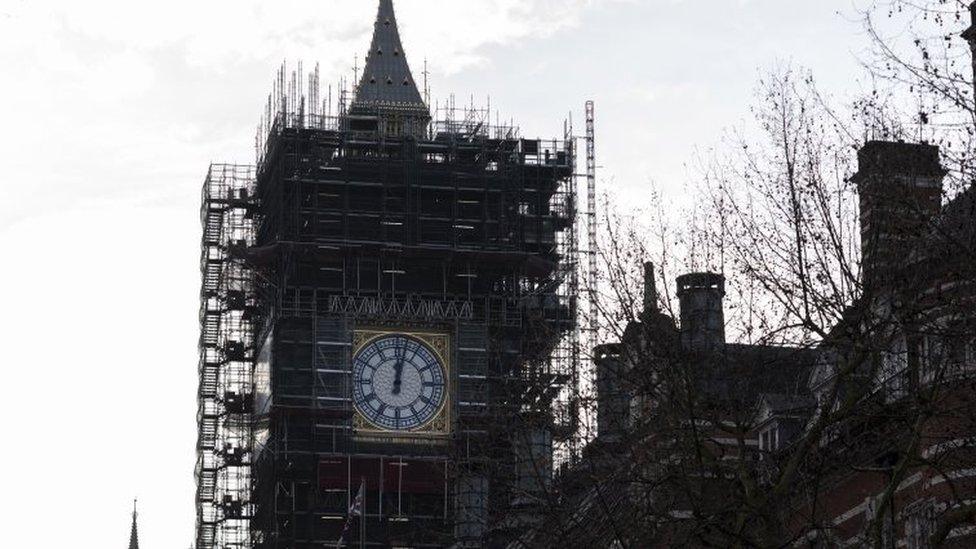
Parliament is not fully back to life, but green shoots are appearing.
Next week sees the return of Westminster Hall debates, where MPs can raise issues great and small with ministers, and get a government reply, although nothing is pushed to a vote.
And the process of setting up the Commons select committees, electing first the chairs, and then the members, is now under way, with nominations to chair the committees closing on Monday, 27 January, with the elections for that phase of the process on Wednesday, 30 January.
Campaigning is already visible, with new MPs being glad-handed by aspiring committee chairs, in person and on social media, at every possible opportunity.
Remember, the parties carve up a deal on which party gets to provide the chair for each committee - so for example the Treasury Committee will be provided by the Conservatives, this time around.
The carve-up reflects the party make-up of the Commons, so the Conservative election victory means that they get to chair a couple of extra committees - which is bad news for Labour's Lillian Greenwood, who chaired transport before the election, but who will now be replaced by a Conservative MP.
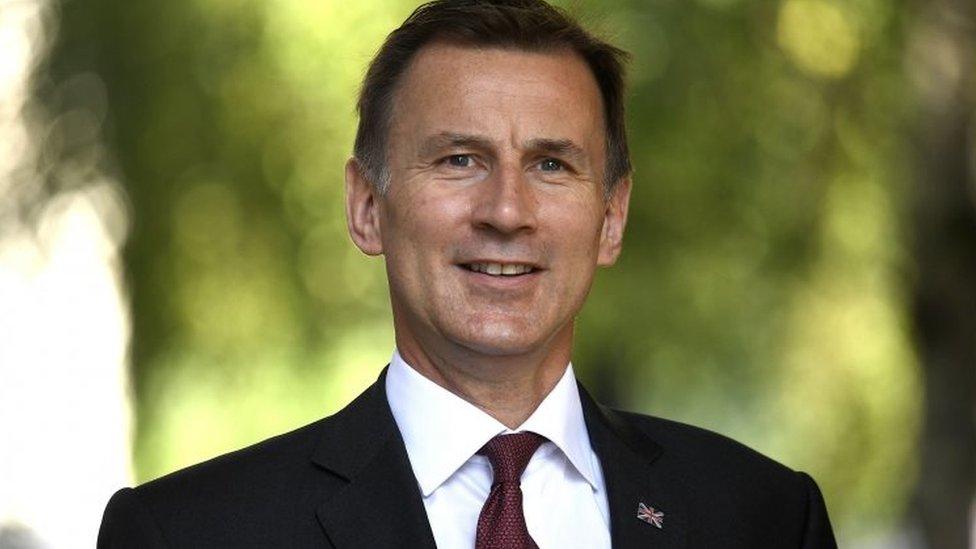
Jeremy Hunt is canvassing for votes again - as he seeks election to be chair of the Commons health committee
Expect to see candidates popping up at relevant question times and debates in the coming days, to demonstrate their grasp of their chosen area.
They will take every opportunity to woo MPs from other parties - because cross-party support is essential to victory, when your own party is choosing between several of its own members.
A developing theme in this new round of elections is of senior ex-ministers, including at least three former cabinet ministers, seeking committee chairs.
The most spectacular example is Jeremy Hunt, the former foreign secretary and, more pertinently the longest-serving health secretary, seeking to chair the health committee.
This has provoked dark mutterings from his rivals about how he would be "marking his own homework" - assessing the success of his tenure in the department, if he won.
Also seeking election is ex-Business Secretary Greg Clark (Science and technology) and the ex-Welsh Secretary Stephen Crabb (Welsh Affairs).
Both are far from veterans, and some critics mutter they might wish to repeat the career trajectory of Nicky (now Baroness) Morgan, who departed the cabinet in 2016 to become chair of the Treasury committee.
After an influential stint there, in one of the most important select committee posts, leapt with gazelle-like agility back into Boris Johnson's new government, as culture secretary. It all makes for an entertaining set of elections, in any event.
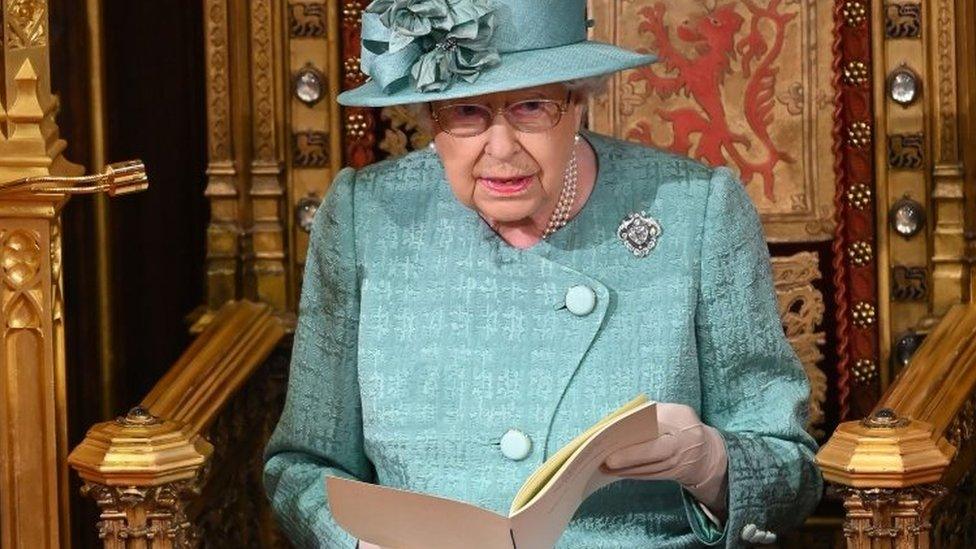
MPs will vote on the Queen's Speech
Meanwhile, the final votes on the Queen's Speech take place in the Commons, while peers may well vote to amend the EU Withdrawal Agreement Bill (the WAB) in their report stage debates on Monday and Tuesday.
No-one should get the idea that their Lordships are seeking to block Brexit, whatever their feelings about it; they are looking at issues around the detail of the bill - notably whether to include guarantees for child refugees (the Dubs amendment), the level of parliamentary scrutiny for post-Brexit trade deals and negotiations with the EU, as the process unfolds, the length of the transitional period after Brexit Day on 31 January and the ability of ministers to direct the courts on the interpretation of EU law.
What this will amount to is peers signalling their disquiet on points of detail, and then, probably, the Commons voting to reject their changes.
While several little interludes have been set aside to allow "parliamentary ping-pong", in which the bill bounces between the Lords and Commons until its final form is agreed.
My guess is that, once rebuffed, peers will accept the verdict of the Commons, although they might water down their changes and try again.
Meanwhile, the other Brexit development to keep an eye on is the publication of the next wave of Brexit legislation - all kinds of bills are in the pipeline, and some may be published in the coming weeks.
Here's my rundown of the week ahead:
Monday 20 January
The Commons opens (14:30) with Education Questions, which may well be followed by the usual post-weekend urgent question or ministerial statement.
The day's main event will be final segment of the debate on the Queen's Speech, where the subject will be the economy and jobs.
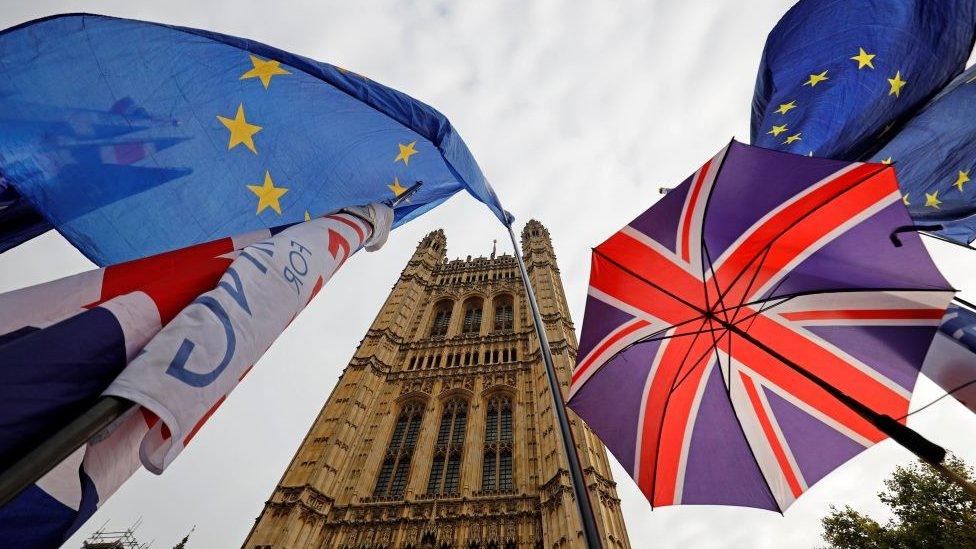
Peers will continue to scrutinise the Brexit bill
There are amendments down from the opposition parties - with Green MP Caroline Lucas regretting a lack of action to address the climate emergency; the SNP and Plaid Cymru regretting the end of free movement and urging that the Withdrawal Agreement Bill should not become law without legislative consent from the Scottish Parliament and the Welsh Senedd; the Lib Dems reference the climate emergency and social justice and Labour regret the continuation of a decade of austerity.
The normal drill is for the Speaker to select the amendments from the official opposition - Labour, and the second largest opposition party, the SNP.
He does have the scope to select a further amendment, building on the precedent set by Speaker John Bercow, back in 2013, when he allowed a group of Tory Brexiteers to put down an amendment calling for an EU referendum - but it would probably require exceptional circumstances for him to feel that was justified. In any event, given the government's majority, the amendments will not succeed.
In the Lords (14:30) questions to minister range across human rights in Indian-administered Kashmir, the treatment of Uighurs in China, the commencement of operations of the Office for Environmental Protection and plans to replace the proposed UK Holocaust Memorial with a national memorial to all victims of extermination or genocide.
Then comes the first day of report stage consideration of the European Union (Withdrawal Agreement) Bill - this is the point at which serious attempts to amend the bill will commence.
It is likely to include an attempt by the super lawyers to amend the section giving ministers the power to direct the courts on interpretation of the law.
Tuesday 21 January
The Commons day opens (11:30) with Business, Energy and Industrial Strategy questions.
Then comes the second reading of the Agriculture (Direct Payments to Farmers Legislative Continuity) Bill. This is an interim measure to ensure that farming subsidies continue to flow immediately after Brexit, confirming the same level of funding to devolved governments for direct payments for 2020 as for 2019.
(This is not to be confused with the much more ambitious Agriculture Bill, which will create a new system of farm support, moving away from direct payments in England towards an approach where farmers are paid public money for "public goods" like improved air and water quality, tackling climate change or animal welfare.)
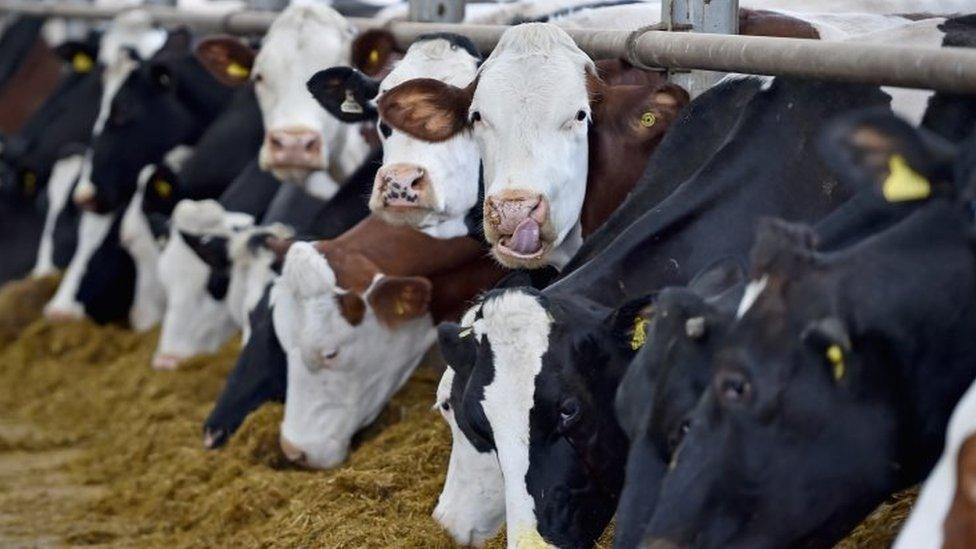
The second reading of the Agriculture (direct payments to farmers legislative continuity) Bill will take place in the Commons
That will be followed by a debate on the phase one report of the Grenfell Inquiry, which looked at the causes of the fire and recommended safety measures for tower blocks.
Meanwhile, debates return to Westminster Hall, starting (09:30) with the Conservative, John Redwood, on growth strategy for the UK.
Other subjects for debate include the contribution of music to the economy and society, led by Labour MP Conor McGinn.
He wants to highlight the UK music industry's £5.2bn contribution to the economy last year, and the challenges it faces around Brexit, at grassroots level - including maintaining local venues and supporting artists - and in promoting and teaching music in schools.
In the Lords, peers start early (11:00) to give themselves extra time for report stage consideration of the European Union (Withdrawal Agreement) Bill.
They break at 14:30 for their usual question time, which will include the former Sea Lord, Lord West of Spithead, asking about the power generation problems affecting Type 45 destroyers, a question on how a federal or confederal system of government could be implemented in the UK, and on a strategy for dealing with alcohol abuse.
After half an hour, the report stage consideration of the European Union (Withdrawal Agreement) Bill continues, including, probably an amendment from Labour's Lord Dubs and his allies to restore the child refugee provisions contained in an earlier version of the bill.
Lord Dubs: Allowing child refugees to be reunited with their families is the "very minimum" UK can do after Brexit
That will be followed by what may be a rather perfunctory third reading debate (amendments at this stage are rare, but not completely unheard of) after which the bill will be sent off to the Queen, to be signed into law, if unchanged, or, if amended, back to the Commons to allow MPs to approve or reject any changes made by peers.
Wednesday 22 January
The Commons day opens (11:30) with questions to the Chancellor of the Duchy of Lancaster and Minister for the Cabinet Office, Michael Gove, arguably the second most important member of the government.
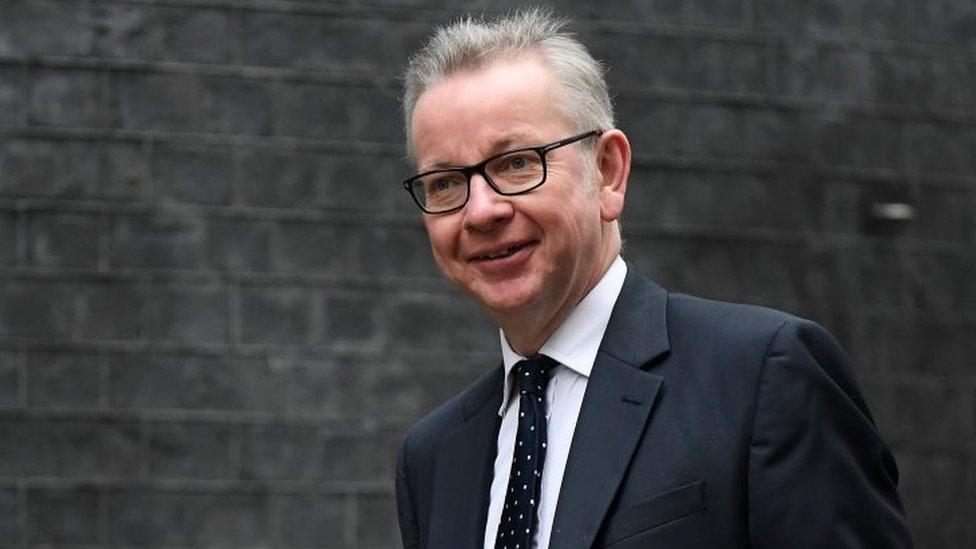
MPs will quiz Michael Gove
At 12:00 comes Prime Minister's Question Time, now restored to its traditional half-hour duration.
The day's main legislating is on the second reading of the the Telecoms Infrastructure Leasehold Property Bill.
This provides a bespoke process for telecoms network operators to gain access to blocks of residential flats and apartments to deploy, upgrade or maintain fixed-line broadband connections, where a tenant has requested the service but the landlord has repeatedly failed to respond.
There's also an hour set aside for consideration of and Lords amendments to the European Union (Withdrawal Agreement) Bill - such a short debating slot that it suggests that almost any change their Lordships have proposed will be rejected out of hand.
In Westminster Hall, debates include South Yorkshire Mayor Dan Jarvis (who remains an MP) on national productivity (09:30).
After the election I highlighted Mr Jarvis as an MP to watch, making the case for more devolution within England to boost the economy; Labour MP Sarah Champion (11:00) raises the safety of all-lane running schemes on motorways.
She will argue the schemes pose an unacceptable risk to the safety of road users and that the government has placed lives in jeopardy in the name of cost savings.
Rotherham man Jason Mercer was killed last summer on the South Yorkshire stretch of ALR motorway.
She will call for the rollout of ALR motorways to be halted and for immediate safety improvements on existing schemes so we do not see more deaths.
Plaid Cymru's Westminster leader, Liz Saville Roberts, will lead a debate on the report of the Commission on Justice in Wales (16:30).
She will argue that the current devolution settlement hampers crime prevention, because the law and order agencies are run from London, while the social services side of the equation is devolved; she says this bolsters the case for devolution of policing and justice to Cardiff.
In the Lords (15:00) questions cover banning expiry dates on gift vouchers, bringing to justice those responsible for violence against journalists and the review of the continuation of the BBC licence fee at the next BBC charter review.
Then, there's provision in the agenda to consider any Commons amendments to the European Union (Withdrawal Agreement) Bill - the expectation is that if MPs refuse to accept any changes made by peers, this is the point at which their resistance will crumble, and the government will get its way.
Peers will then deal with a pair of justice orders and regulations: the Release of Prisoners (Alteration of Relevant Proportion of Sentence) Order 2019, and the Criminal Justice and Courts Act 2015 (Consequential Amendment) Regulations 2019.
The purpose of these is to push back the point at which offenders sentenced to standard determinate sentences must be automatically released, from halfway through their sentence, to the two-thirds point.
The government says its intention is to provide robust sentences for dangerous and serious offenders ensure that the time they spend in custody reflects the severity of their crimes and takes account of the risk they pose to the public.
There's even a select committee hearing - I think the first public evidence-taking of the new Parliament, as the Lords International Relations and Defence Committee (10:10) opens its inquiry into sub-Saharan Africa.
Giving evidence are former Secretary of State for International Development Andrew Mitchell MP and Labour's David Lammy, who will discuss how the UK's colonial history affects perceptions of sub-Saharan Africa.
Thursday 23 January
MPs begin their day (09:30) with half an hour of International Trade Questions, after which the Secretary of State, Elizabeth Truss, stays at the Despatch Box for more questions, in her other role as Minister for Women and Equalities.
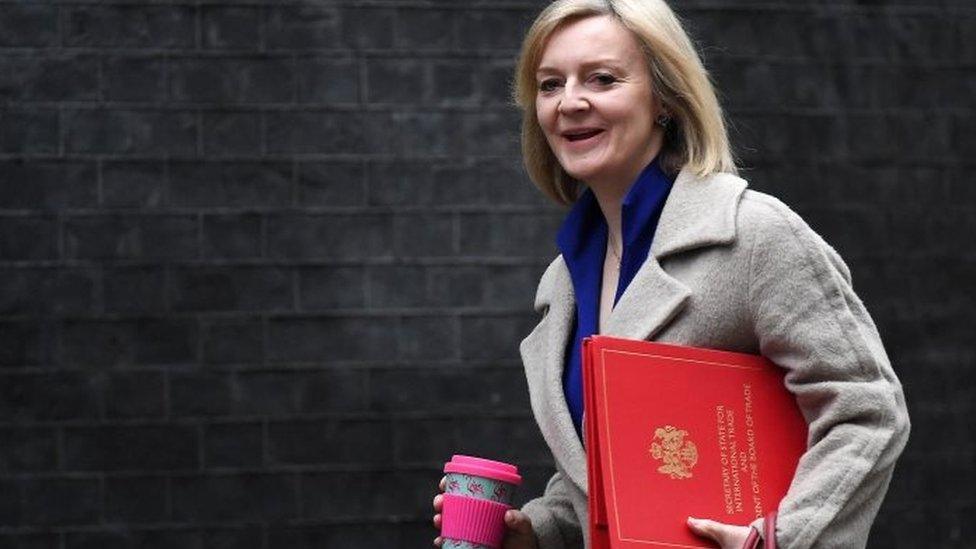
Elizabeth Truss will be at the despatch box taking questions from MPs
Next comes the Leader of the House of Commons, Jacob Rees-Mogg, with the weekly statement on forthcoming Commons Business.
The main event will be the annual debate to mark Holocaust Memorial Day.
In the Lords (11:00) the day begins with the introduction of another new peer, the Appeal Court judge, Baroness Hallett, who will sit as a crossbencher.
Questions to ministers range across the environmental aspects of government trade policy, legislation to match the US government's sanctions powers, reducing homelessness and government policy on sanctions in Syria.
That is followed by a 20-minute question time for the Culture Secretary, Nicky (now Baroness) Morgan, following the precedent set Lord Adonis and Lord Mandelson who were departmental ministers sitting in the Lords under Gordon Brown.
The question time will be a regular event for as long as Baroness Morgan continues in the role.
Then peers will debate two select committee reports, first on "Fisheries: implementation and enforcement of the EU landing obligation and The EU fisheries landing obligation: six months on" and then on the report from the Economic Affairs Committee: "Rethinking High Speed 2", which argued that the government should prioritise spending on transport infrastructure in the north of England over the controversial high speed rail project.
With a report on HS2 from the financial watchdog, the National Audit Office due soon, a lively debate on the future of the scheme is going to be a major theme of the next few parliamentary months.
The speakers list includes the former Transport Secretary, Lord Adonis, one of HS2's strongest supporters. Bring popcorn.
Neither House is due to sit on Friday.
